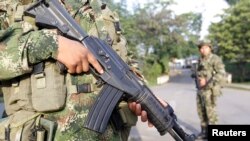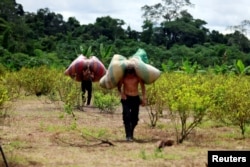Four people were killed and at least 14 injured Thursday in a confusing attack on protesting coca farmers that authorities blamed on a dissident faction of a disarmed guerrilla group and local activists attributed to government security forces opening fire.
The disputed incident underscores the security challenges Colombia faces as it tries to uproot a booming harvest for coca, the raw ingredient for cocaine, a market that is a powerful magnet for dissident rebels and criminal gangs even after last year's deal to end a half-century conflict with the Revolutionary Armed Forces of Colombia.
The now-disarmed guerrilla group commonly known by the acronym FARC was long a dominant player in the narcotics trade and used it to fund its insurgency.
Colombia's Defense Ministry said holdout rebels from the former Daniel Aldana front of the FARC launched five homemade mortars and fired weapons at coca growers who were demonstrating in a rural area of Tumaco, a municipality along the Pacific Ocean that produces the largest amount of cocaine coming out of the South American nation.
The ministry said the protesters were ordered by the guerrillas to confront soldiers escorting a group of civilians carrying out coca eradication efforts. At least seven of the injured were evacuated by army helicopter.
But Jose Santacruz, a community activist in Tumaco, said coca growers began amassing by the hundreds Wednesday to demand security forces abandon plans to forcibly eradicate the illegal crops, on which thousands of farmers in the area depend.
Santacruz, who was not present at the time of the attack, said witnesses told him there was no presence of the dissident FARC rebels in the area and it was government security forces that opened fire on the protesters.
The Associated Press attempted unsuccessfully to reach community leaders who were present, and was unable to independently verify either Santacruz's or the military's account.
Clashes between coca growers and security forces have become more frequent as production of cocaine in Colombia surged to record levels in recent years.
The government estimates that some 400 FARC rebels have refused to lay down their weapons as part of the peace deal and are morphing into gangs devoted exclusively to drug trafficking and other criminal activity.





